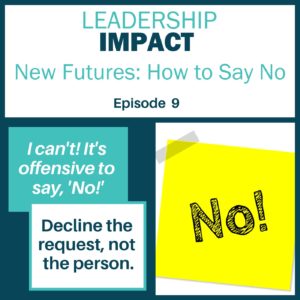
“If you can’t decline, you can’t accept. If you can’t say ‘No,’ you can’t say ‘Yes.’” – Kari Zeller
Welcome to Leadership Impact, the podcast for modern executives who are reinventing leadership within their organizations. Hosted by executive leadership coach and CEO of TGN Consulting, Kari Zeller (FKA Granger), and Sound Financial Group CEO, Paul Adams, this podcast aims to address the topics of performance and leadership through real life examples. In this episode, we begin our five-part series on new futures.
In this episode, Kari and Paul talk all about the importance and the power of saying ‘No.’ Oftentimes, people don’t want to decline an offer or a request out of the fear of disappointing someone, or missing out on an opportunity or other various concerns. Kari begins the show by talking about our declarations and the crucial part they play in creating new futures. Counterintuitively, Kari and Paul begin the series on new futures with a discussion about what we should not do. Kari delves deep into an issue that many people run into in business and life: the underdeveloped capacity to say ‘No.’ There are, in fact, many positives that can come from this declaration. Saying ‘No’ can open up space for other opportunities that otherwise would not have revealed themselves. Paul provides an example of a business owner he knew that would always say ‘Yes,’ and the negative impact this had on both his health and his overall performance. Kari interprets Paul’s example as a classic case of someone who was looking for a sense of belonging or affinity by always accommodating requests.
Finally, Kari and Paul share their own strategies of how to get honest answers from their employees when making requests. They both have realized that being specific and open in their communication is the key to accepting ‘No’ and understanding the reasons behind ‘No.’ Paul challenges the audience to watch for the places in their lives where saying ‘No’ opens up the space to say ‘Yes’ to something new.
What We Covered:
00:27 – Introducing today’s topic: How to Say No
01:15 – Kari discusses the importance of declarations
02:16 – Paul’s experience working with a business owner who would always say ‘Yes’
03:26 – The underdeveloped capacity to say ‘No’
04:11 – The negative impact saying ‘Yes’ can have on health and performance
05:12 – Kari talks about the power of ‘No’
06:42 – Kari suggests that the businessman from Paul’s example said ‘Yes’ out of a need for affinity or belonging
08:11 – How saying ‘No’ can open up space for other opportunities
08:28 – Kari describes her strategic approach to launching TGN Consulting
09:19 – Paul reminds the audience that even the people we say ‘No’ to may still willing to work with us on other business aspects
09:46 – Kari provides an example of how she utilized the capacity to say ‘No’ in her own business
11:27 – Paul provides a tip for those looking to increase their capacity to say ‘No’
14:11 – How to receive a ‘No’
16:09 – Paul states the ways people around him try to say ‘No’
17:10 – The habits Paul and Kari have incorporated into their lives to get the most accurate answers
20:00 – How saying ‘No’ can shape and create new futures
22:11 – Paul challenges the audience to watch for the places where opportunities to say ‘No’ creates the space to say ‘Yes’ to something new and to help others do the same
Quotes:
“If you can’t decline, you can’t accept. If you can’t say ‘No,’ you can’t say ‘Yes.’”
 LEADERSHIP IMPACT PODCAST
LEADERSHIP IMPACT PODCAST
See more episodes
Other places to find us:
- Apple Podcasts
- Audible
- Libsyn
- (Or wherever you listen to podcasts!)
Links:
- Kari’s Website
- Paul’s Website
- Kari’s Online Courses about Leadership Performance, Accountability, and Trust
- Paul’s Other Podcast: Your Business Your Wealth
Acknowledgements:
Our work is mosaic art. We read, study, and practice many philosophies, methodologies, and modalities of human performance, to ensure that our approach best serves our clients. We would like to acknowledge all of the thought leaders and organizations, whose ground-breaking work has influenced the TGN Consulting approach – especially Fernando Flores, Jim Selman, Michael C. Jensen, Julio Olalla, Pluralistic Networks, The Newfield Network, and the Strozzi Institute.


Podcast production and marketing provided by FullCast.

